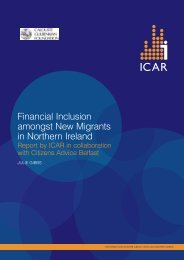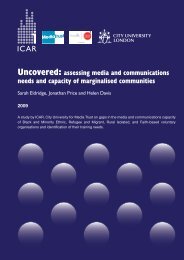Navigation guide Refugee populations in the UK: Algerians - ICAR
Navigation guide Refugee populations in the UK: Algerians - ICAR
Navigation guide Refugee populations in the UK: Algerians - ICAR
You also want an ePaper? Increase the reach of your titles
YUMPU automatically turns print PDFs into web optimized ePapers that Google loves.
emigration of refugees and more <strong>Algerians</strong> request asylum <strong>in</strong> Europe than enter Europe for any o<strong>the</strong>r<br />
reason.<br />
The results of claims registered by <strong>Algerians</strong> have fluctuated considerably <strong>in</strong> <strong>the</strong> <strong>UK</strong>. Asylum claims from<br />
<strong>Algerians</strong> were especially successful <strong>in</strong> 1998 and 1999 but <strong>in</strong> <strong>the</strong> early 1990s and s<strong>in</strong>ce 1999, <strong>Algerians</strong><br />
have been less likely to be granted asylum than all nationalities taken toge<strong>the</strong>r. 53 From 1990 onwards,<br />
<strong>Algerians</strong> have also been far less likely to receive Exceptional Leave to Rema<strong>in</strong> (ELR) than <strong>the</strong> average for<br />
all nationalities comb<strong>in</strong>ed. 54<br />
Several observations have been advanced to suggest that asylum policy does not impact positively on<br />
<strong>Algerians</strong>’ decisions to choose <strong>the</strong> <strong>UK</strong> as an asylum dest<strong>in</strong>ation.<br />
• In common with most asylum seekers <strong>in</strong> <strong>the</strong> <strong>UK</strong>, <strong>Algerians</strong> have very little <strong>in</strong>formation on <strong>the</strong><br />
asylum system before <strong>the</strong>y arrive. Even those <strong>in</strong>terviewed <strong>in</strong> <strong>the</strong> former Red Cross Centre at<br />
Sangatte could give no precise <strong>in</strong>formation on <strong>the</strong> British asylum system. 55<br />
• The rise <strong>in</strong> <strong>the</strong> number of Algerian asylum seekers <strong>in</strong> certa<strong>in</strong> years does not correspond to <strong>the</strong><br />
years when <strong>the</strong>y were most likely to receive asylum, suggest<strong>in</strong>g that <strong>the</strong> likelihood of receiv<strong>in</strong>g a<br />
positive decision on <strong>the</strong>ir claim was not a factor. 56<br />
• Despite <strong>the</strong> fact that <strong>the</strong> <strong>in</strong>terpretation of <strong>the</strong> issue of agents of persecution <strong>in</strong> <strong>the</strong> British courts is<br />
favourable to <strong>Algerians</strong> (see box 1), <strong>the</strong> <strong>UK</strong> still does not receive large numbers of Algerian asylum<br />
seekers.<br />
Agents of persecution<br />
Article 1A(2) of <strong>the</strong> 1951 Geneva Convention on <strong>the</strong> Status of <strong>Refugee</strong>s def<strong>in</strong>es who is a refugee. One<br />
of <strong>the</strong> essential elements <strong>in</strong> this def<strong>in</strong>ition is ‘a well founded fear of be<strong>in</strong>g persecuted’. The Geneva<br />
Convention is not specific as to <strong>the</strong> source of this persecution but it is generally accepted that it may<br />
arise under three sets of circumstances. 1<br />
I. The persecution is derived from <strong>the</strong> state.<br />
II. The persecution is derived from an agent o<strong>the</strong>r than <strong>the</strong> state but <strong>the</strong> state encourages or<br />
tolerates this persecution.<br />
III. The persecution is derived from an agent o<strong>the</strong>r than <strong>the</strong> state but <strong>the</strong> state is powerless to offer<br />
any protection.<br />
Situations (I) and (II) are uncontroversial and asylum is usually granted. Controversy arises <strong>in</strong> <strong>the</strong> third<br />
case and <strong>the</strong>re is disagreement between European judicial systems over whe<strong>the</strong>r <strong>the</strong> third case counts<br />
as persecution or not. Any Algerian flee<strong>in</strong>g persecution from an armed group will fall <strong>in</strong>to this category<br />
s<strong>in</strong>ce this persecution is occurr<strong>in</strong>g because <strong>the</strong> government is powerless to prevent it. The French and<br />
German judicial systems both argue that type (III) is not persecution and have rejected a great many<br />
asylum claims from <strong>Algerians</strong> as a result. The Franco-German position is referred to as <strong>the</strong><br />
53 Based on <strong>the</strong> number of <strong>Algerians</strong> who were granted asylum (after <strong>the</strong> first decision and on appeal) as a percentage<br />
of all <strong>Algerians</strong> who requested asylum, compared with <strong>the</strong> same <strong>in</strong>dicator for all nationalities.<br />
54 All based on Home Office statistics.<br />
55 Collyer, M. (2002) ‘Expla<strong>in</strong><strong>in</strong>g change <strong>in</strong> established migration systems: <strong>the</strong> movement of <strong>Algerians</strong> to France and<br />
<strong>the</strong> <strong>UK</strong>’ University of Sussex, DPhil <strong>the</strong>sis, bound and recorded at <strong>the</strong> British Library.<br />
56 Collyer, M. (2002) ‘Expla<strong>in</strong><strong>in</strong>g change <strong>in</strong> established migration systems: <strong>the</strong> movement of <strong>Algerians</strong> to France and<br />
<strong>the</strong> <strong>UK</strong>’ University of Sussex, DPhil <strong>the</strong>sis, bound and recorded at <strong>the</strong> British Library.<br />
<strong>Navigation</strong> <strong>guide</strong> to refugee <strong>populations</strong>: <strong>Algerians</strong><br />
©<strong>ICAR</strong> 2004, moral rights Michael Collyer<br />
22

















